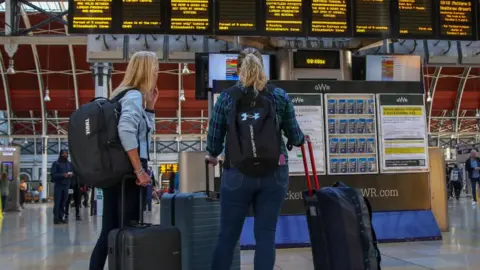Rail strikes: Passengers warned not to travel by train next week
 Getty Images
Getty ImagesTrain passengers are to be told to only travel next week if it is absolutely necessary, even if rail worker strikes are called off at the last minute.
Workers at the UK's biggest rail union, the RMT, will walk out on 13-14 and 16-17 December causing major disruption.
It is part of a long-running dispute between unions, operators and Network Rail over pay, jobs and conditions.
Disruption will be inevitable even if strikes are aborted because of how long it takes to restore a normal timetable.
Network Rail, which owns and maintains Britain's railway infrastructure, said 50% of the railways will be shut down on strike days, regardless of whether the walkouts go ahead.
Only 20% of services will operate between the hours of 07:30 and 18:30 GMT, it added.
Delays and cancellations are also expected on non-strike days during the week, because trains will be in the wrong places and staff shift patterns mean it takes time for all workers to return to work.
The RMT has staged a series of strikes since the summer involving about 40,000 rail workers employed by Network Rail and 14 train companies.
Further action is planned with Network Rail workers set to strike from 18:30 on Christmas Eve until 27 December.
They will then be joined by workers at the train companies for strikes on 3-4 January and 6-7 January.
Businesses, particularly those in hospitality, have raised concerns over the impact of the strikes during the busy festive period, with industry experts suggesting more than £1.5bn of trade could be lost.

Several meetings between unions bosses, train companies and Network Rail have so far failed to prevent strikes on the railways, which have been happening on and off for months.
The RMT is involved in two negotiating battles, one with Network Rail, where it represents signallers and maintenance workers, and the other with the Rail Delivery Group (RDG), which represents the 14 train companies.
The union has rejected an RDG offer which included a 4% pay rise both this year and next.
It has decided to put Network Rail's offer, which includes a 5% pay rise this year and a 4% rise next year, to its members in an electronic referendum, but has called for it to be rejected.


As things stand, next week's strikes will go ahead.
Even if they are cancelled, significant disruption now looks inevitable. Network Rail had said Monday night was the deadline for action to be called off, to give time to switch back to a normal timetable.
As with previous national RMT strikes, very few trains will run and some places will have none at all. A key reason is the involvement of Network Rail's signalling staff across Britain.
The organisation and ministers have long called for the RMT to let workers decide whether to accept a proposed offer. The union's members at Network Rail - unlike those at train companies - are now getting a vote.
But we won't know the result of that electronic referendum until Monday afternoon, the eve of the first 48-hour strike.
Even if the deal was accepted (against the recommendation of the RMT), it would be too late to reinstate normal services on Tuesday.

The rail industry is not the only sector facing strike action, with postal workers, bus drivers, teachers and nurses all set to walk out this month. Ambulance staff across many parts of England and Wales are also set to strike on 21 and 28 December.
Workers are demanding better conditions and pay rises that match inflation, as the cost of living rises at its fastest rate for 41 years.
On Wednesday, Transport Secretary Mark Harper told a committee of MPs that he was "very disappointed" that the RMT had turned down the pay offers.
He said the dispute was not just about pay, but about reforming the railways, as fewer people were using trains compared to before the pandemic.
"The taxpayer has put £31bn of support into the rail industry over the past two years," he said. "That's equivalent to over £1,000 per household in the country. That is the context about why we need reform."
He added commuter traffic was about 60% of what it was pre-pandemic, due to more people working remotely.
RMT general secretary Mick Lynch has said he regrets the inconvenience caused by the strikes but added that the government is ultimately to blame. "They are running the playbook and the strategy for the railway companies and directing what's going on," he said.

How will you be affected by the rail strikes? Are your Christmas plans being disrupted? Share your experiences by emailing [email protected].
Please include a contact number if you are willing to speak to a BBC journalist. You can also get in touch in the following ways:
- WhatsApp: +44 7756 165803
- Tweet: @BBC_HaveYourSay
- Upload pictures or video
- Please read our terms & conditions and privacy policy
If you are reading this page and can't see the form you will need to visit the mobile version of the BBC website to submit your question or comment or you can email us at [email protected]. Please include your name, age and location with any submission.
